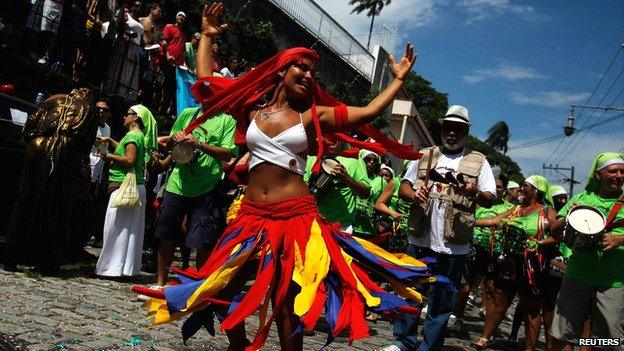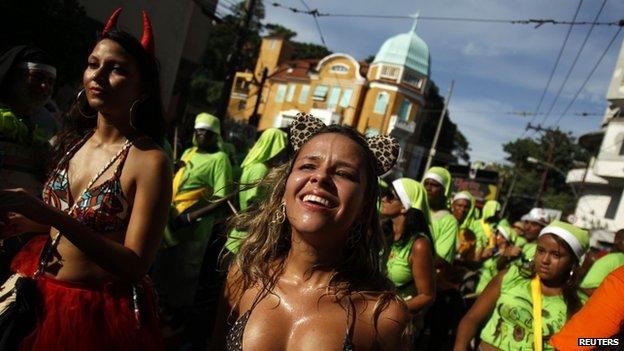Carnival 2013: Brazil party's subdued start in Rio
- Published

The carnival is set to draw nearly a million tourists to Rio, generating some £420m for the local economy
Brazil's annual carnival has kicked off, but the parades and street parties have a sombre tinge coming after a nightclub fire that killed 238 people.
Mourning rituals continued as the mayor of Rio de Janeiro handed over the keys of the city to carnival ceremonial figurehead King Momo.
President Dilma Rousseff attended a memorial Mass for the fire victims at Brasilia's cathedral on Thursday night.
She is not taking part in the five-day party, spending it in Bahia state.
More than 60 casualties of the inferno remain in hospital, and many cities - particularly near the southern city of Santa Maria where the fire happened - have scaled down their festivities as a result.
Feathers and floats

This year, more than 700 street parades will make their way through Rio
For Brazil, Carnival 2013 is an important test of the city's infrastructure ahead of the big sporting events lined up for the future, including the World Cup in 2014 and the Olympics in 2016, says the BBC's Julia Carneiro in Rio.
Streets in Rio, where festivities kick off on Saturday, were already crowded on Friday with thousands of people, following more spontaneous street parades.
This year, more than 700 processions will make their way through various parts of the city, with US actress Megan Fox among the international celebrities expected to take part
The carnival is set to draw 1.1m tourists to Rio, generating some $650m (£410m) for the local economy. Hotels and restaurants are booked almost to capacity.
South Korean pop phenomenon Psy - whose trademark Gangnam Style dance mimicking trotting on a horse, holding the reins and spinning a lasso has made him a household name - will perform during the street parties in Brazil's third largest city, Salvador.
Last year, the Cordao da Bola Preta, one of Rio's oldest and most popular carnival street parties, attracted 2.2m revellers - the largest crowd in its 93-year history.
From Sunday, Samba schools compete with each other at spectacular parades in special stadiums known as sambadromes - with elaborately decorated floats and dancers wearing multicoloured costumes often adorned with large feathers.
- Published18 February 2012